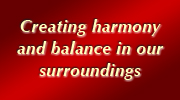
|

|

|

|
Feng shui (pronounced "fung shway") is the ancient Chinese art of living in harmony with our surroundings. This basic goal, however, transcends any particular culture, as ancient peoples everywhere lived harmoniously with their surroundings or they didn't survive. For me, feng shui has a close connection with Native American teachings. Today many of us have lost touch with our surroundings and are not aware of the profound affect they have on us. Nor are many aware of how they reflect their surroundings. Feng shui teaches us an awareness and understanding that enable us to have our surroundings work for, rather than against, us.
There is some confusion surrounding the different schools of feng shui. Compass school advocates use specific directions that are determined by mathematical formulas, numerology, and/or astrological information. There are actually several different branches of the compass school. Form school teaches about the most powerful positions for houses and other buildings, rooms within structures, and furniture within the rooms. These two schools are both several thousand years old. Although they are both practiced in China today, form school overrules the compass directions if there is a conflict between the suggestions of the two.
In the 1980's Professor Thomas Lin Yun introduced Black Tantric Buddhist (BTB) Feng Shui to the United States. He eliminated the compass orientation of the bagua and included form school principles in his teaching. Rather than relying on compasses and mathematical formulas, Professor Lin Yun taught a more spiritual approach, emphasizing intuition and conscious intention. Today many practitioners follow his teachings and some have modified them further. I find this western approach more compatible with our lifestyle in the United States and with my own beliefs.
Regardless of the school, all feng shui involves four major components. The first of these is the flow of chi or energy. Feng means wind and shui means water. In addition to representing the unseen and the seen in our lives, they symbolize the flow of energy in our surroundings. Environments are most comfortable and inviting when the flow of chi is like a meandering stream or a gentle breeze. Clutter and poorly placed furniture are main causes of blocked chi. A long straight hallway is an example of rushing chi. Sharp corners are referred to as cutting chi. The goal is to achieve a feeling of harmony and balance.
The second component, or layer, of feng shui is the bagua, the template or grid that is superimposed upon any property, structure, room or even furniture within the room. The nine sections of the bagua correspond to aspects of our lives: health and family, prosperity, fame and reputation, relationships, creativity and children, benefactors and travel, career, self-knowledge and introspection. The center, or ninth area, represents our center, the place of oneness, balance, and an openness to possibilities. These areas can be enhanced with light, crystals, plants, water fountains, wind chimes, color, mirrors, art, and other items.
The third layer is the balance of yin and yang. Cool, dark, low, floral, horizontal, soft, and feminine are some yin qualities. Warm, light, straight, high, geometric, vertical, hard, and masculine are yang. While the goal is balance , it is important to honor personal preferences.
The fourth layer is the balance of the five elements: fire, earth, metal, water, and wood. Substance, color, shape, and other qualities determine the element(s) of any particular object. Although the most difficult layer with which to work, the balance of the five elements can have a profound affect on spaces and people who inhabit them.
By working with these layers of feng shui, spaces can be transformed to work for you, rather than against you. By applying feng shui principles, relationships, career, prosperity, health, and other aspects of life can be favorably influenced. You are a reflection of your surroundings and your surroundings affect you.
Change your surroundings and change your life!
Call a Feng Shui Consultant when you want to:
- feel more balanced and centered
- increase prosperity
- improve relationships
- sell a home
- create a home office
- make your home more comfortable and inviting
- restore family harmony
- feel more creative
- get the credit you deserve
- design a new home or office
- build an addition to your existing house
- improve health
- clear clutter and don't know where to start
- get "unstuck"
- attract more customers or clients to your business
- increase productivity
- feel more focused
- and more....
Copyright 2000-2011 Feng Shui Vermont
Carol C. Wheelock
|

|

|










